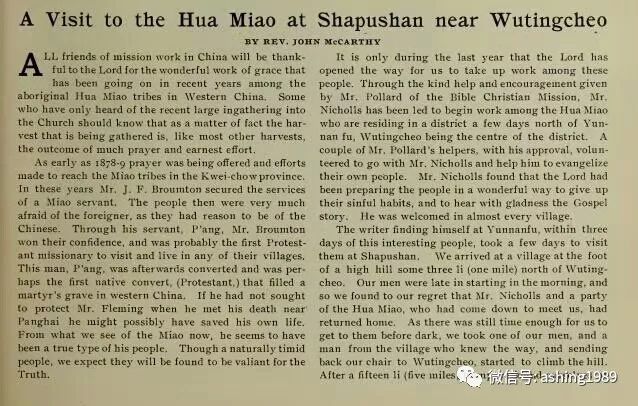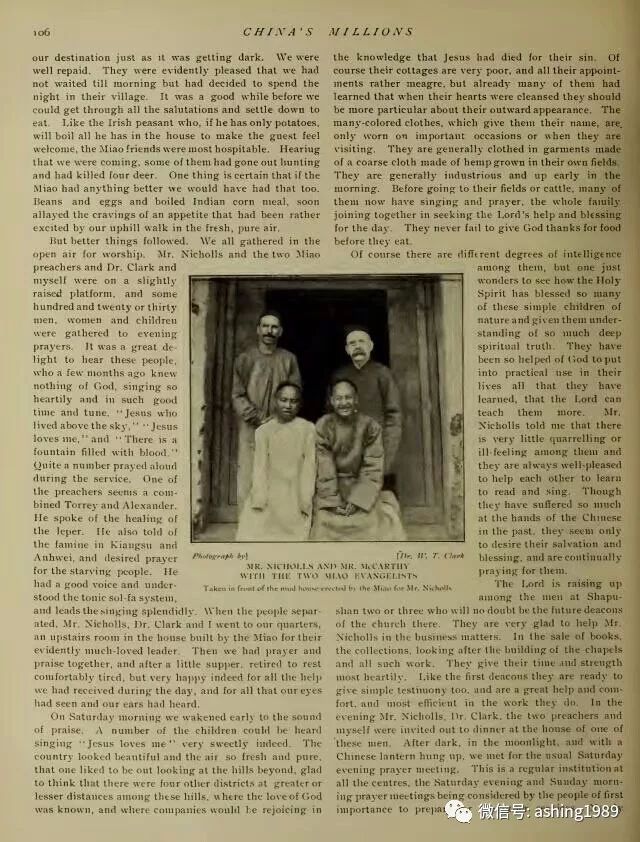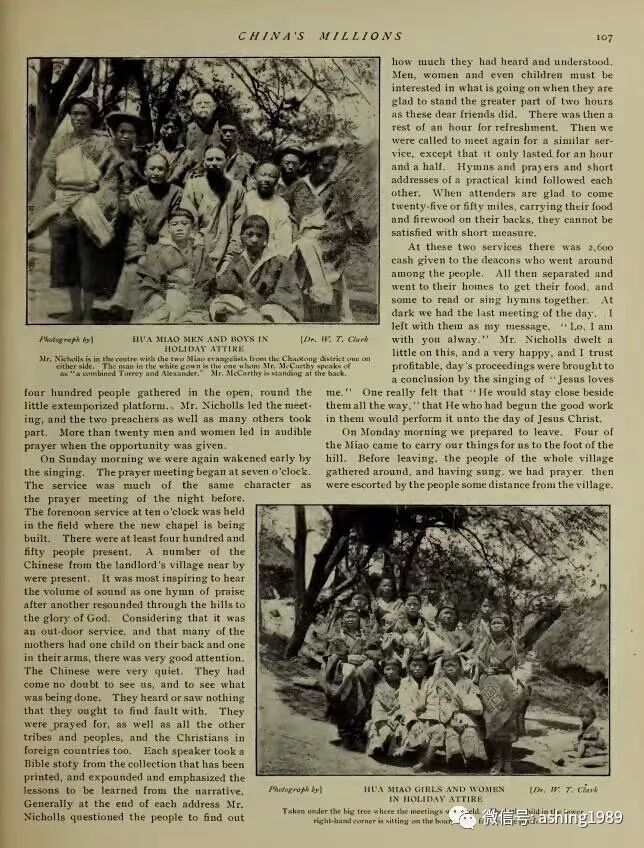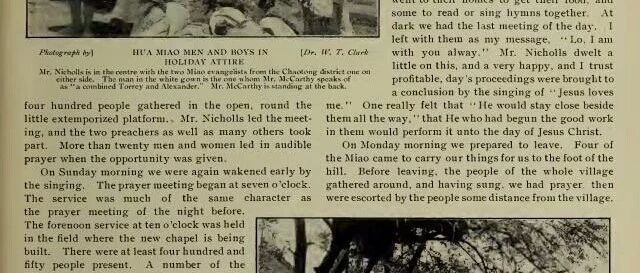
洒普山教会的创始见证
文/约翰·麦卡锡
译/ 华慧娟
校/ 阿信
在中国的传教士无不因在西部花苗部落所取得的丰硕成果向主献上感恩。近一段时期,因为花苗人纷纷涌来教会,有很多的朋友开始听闻这一宣教事工。但这些朋友应该知道的是,像其它的丰收一样,教会在花苗宣教上的丰收是藉着持续的祈祷和不懈的努力积累而成的。
早在1878年到1879年,就有传教士为贵州的苗族部落祷告。那些年巴子成牧师(Mr. J. F. Broumton)聘请了一位苗族人潘寿山(P’ang)为他工作。起先,苗族人很害怕外国人,就如他们害怕汉人一样。在潘寿山的帮助下,巴子成先生去往苗族人的寨子里探访,他第一位去往苗寨的新教传教士。他逐渐获得苗族人的信任。潘寿山很可能是当地第一位皈依基督的信徒,后来受洗并为主殉道。 如果不是因为在贵州庞海(Panghai)舍命保护明鉴光教士,他或许不会在那场教案中丧命。现在回过头来去看,潘秀山弟兄无疑是苗族信徒的典型代表。虽然胆怯是人的本性,但一旦认识真理,他就对福音异常坚定。
1906年,主才开启对云南洒普山一带苗人的传教之路。藉着圣经基督教教会柏格理牧师的激励和帮助,郭秀峰牧师( Mr. Nicholls )去往位于昆明北部,距离昆明有好几天路程的武定苗族人聚居区,扎根那里建立教会。柏格理牧师的两位苗族助手在得到柏格理牧师的祝福后,自愿和郭秀峰牧师一起来到武定给自己的民族传播福音。到洒普山之后,郭秀峰牧师很快发现,几乎所有的苗寨都对福音使者敞开了大门。主已经预备好武定苗族人的心灵,他们决心放弃他们以前的陋习,欢欢喜喜听从福音。
我在昆明和郭秀峰牧师交流了3天,然后又去往洒普山苗寨做了几天时间的探访。当我们一行抵达武定县城以北大约3里地(1英里)、位于洒普山山脚下的一处苗寨时,很遗憾地获悉由于我们早晨没能按时出发,比预定到达时间晚了很多,郭秀峰牧师及其他迎接我们的人已经上山回家了。幸运的是,我们还有足够的时间在天黑前赶上他们。
我们只留下一个随从,请其他人把轿子抬回武定县城,并在村子里请了一位向导,然后大家开始登山。徒步15里地(5英里)之后,我们终于抵达目的地,而天也差不多全黑了。发现不用等到明天早上才能看到客人,苗族信徒异常开心。我们决定当天上山抵达苗族村寨的努力获得了丰硕的回报。
晚饭前是一段美好的彼此交流的时光。就像那些家里穷的只有土豆果腹,还要慷慨地把它们全部煮熟招待贵客的爱尔兰农民一样,为了欢迎我们的到来,一些苗族朋友专门打了四只野鹿回来。晚餐还有热腾腾的豆荚、鸡蛋和煮包谷,真是太美味了。吃着吃着,我们一行爬山的辛劳一扫而空。

更好的事情还在后面。饭后,所有人走到露天下礼拜。我和郭秀峰、克拉克先生(Mr. Clack),以及柏格理牧师差来的两个苗族传道员站上一个矮矮的台子,台下聚拢起100多位男女和孩童,大家一起敬拜赞美。看到这些几个月前还对上帝一无所知的人们忘情地唱着赞美诗,听见他们的音调离奇地合拍,我的内心充满了喜悦。众人唱的赞美诗有《耶稣住在高天之上》(Jesus who lived above the sky)、《耶稣爱我,我知道》(Jesus love me)、《宝血充溢的喷泉》(There is a fountain filled with Blood)等,唱歌期间,不断有人放声祈祷。其中一位苗族传道员有一副好嗓音,熟悉梭发谱(sol-fa),带领着大家合唱。他讲起话来就像拖雷和亚历山大(Torrey and Alexander)的合体,他祈求上帝治愈麻风病人,并让众人齐心合力为甘肃、安徽正在爆发的饥荒祷告。
聚会结束后,郭秀峰、克拉克和我三位传教士住进入苗族人为他们心爱的耶稣新建的教堂的二楼。我们又吃了点夜宵,并为得到苗族信徒如此友爱的帮助,为这天眼睛所看到耳朵所听到的一切向神献上赞美。然后,我们就进入梦乡。
礼拜六清晨,我们被高昂的赞美声叫醒,原来是一群孩子在院子里大声在唱《耶稣爱我,我知道》。风光旖旎、空气清新,我们走到村外一处山岗,极目远望,但见四周林木葱葱。想到距这里或远或近,已有四个村落的乡亲听闻上帝的爱,晓得耶稣替他们的罪钉死在十字架上,赦免了他们的罪。我们为此深深感恩。
苗族人的家很破旧、家具粗糙,但已经有很多人明白,当他们的心灵被神净化之后,他们的外表也会全然发生改变。“花苗”这个名字来自他们只有在重要节日和走亲戚时所穿的五彩斑斓的礼服,平时下地干活时他们穿的是亚麻制作的粗布衣服。他们每天很早起来,在下地种庄稼、野外放牛之前,很多人家会先聚在一起祷告赞美,寻求上帝的保守。他们从不会忘记做饭前祷告。
村民们的聪明程度参差不齐,但让人惊奇地是圣灵大大地祝福这些生活在自然之中的单纯的神国子民,让他们这么快就不仅记着许多属灵的真理(spiritual truth),而且靠着上帝的帮助,把这些真理运用到实际生活当中。郭秀峰牧师告诉我,吵架和彼此敌视的现象在这里很少见,苗族人相互友爱,在学习上彼此帮助。虽然在历史上他们深受汉族人的欺压,但他们不计前嫌,热诚地为汉族人祷告,祈求神的祝福临到他们。
毫无疑问,主正在这里拣选和培养两、三位将来会成为洒普山教会执事的仆人。这几个弟兄很殷勤地协助郭秀峰牧师办理教会日常事务,包括照看教堂、售卖圣经和赞美诗等等。作为教会第一批执事,他们用简朴的语言见证主,安慰伤痛,高效工作,是传教士最好的帮助和安慰。
这天傍晚时分,其中一个执事邀请我、郭秀峰、克拉克,及两个布道员去他们家吃晚饭。天黑后,在明媚的月光下再点起一盏中国油灯,这里举行例行的周六晚间祷告会。在洒普山和周围的四个聚会点,周六晚和礼拜天早上的祷告会是对礼拜天正式敬拜的最好预备。这天有将近400人聚拢在一小块高台周围,敬拜由郭秀峰牧师主持,协助他的是两个苗族布道员和其他一些人。聚会中,有20多位男男女女大声开口祷告赞美。
礼拜天早晨我们又被歌声唤醒。7点晨祷开始,议程和昨晚相似。上午10点的礼拜在正在修建中的教堂地基上举行,至少有450人参加。一些住在周围村寨的汉人也赶来看热闹。赞美的歌声此起彼落,回荡于群山之间,直抵天庭,让人热血沸腾。许多妈妈背上背着婴儿,臂弯里还抱着一个,但唱歌时她们聚精会神。人群里的汉族人很安静,带着挑剔的眼光看着这一切,没有发现我们有任何不良的意图。当传教士和少数民族信徒开始祷告时,他们也随着一起祷告。每个讲道的人都从印刷出来的《经文集》中选一个圣经故事讲给听众,并分享自己看完这个故事后学到了什么。每当一个讲员讲完,郭秀峰牧师都会很体贴地询问大家听懂了多少。
整整两个小时站着礼拜之后,所有的弟兄姊妹和孩子们一定都很好奇接下来会是什么活动:大家先休息一个小时,紧接着是另一场持续一个半小时的敬拜。唱诗、祷告和简短的布道依次举行。很多人扛着粮食和柴火,跋涉25到50英里(40-80公里)的山路赶来参加,他们意犹未尽,给我们抱怨说敬拜时间不够长呢!
两场聚会共收到2600元的现金奉献。中午众人去各人各家或是自己的亲戚朋友家吃饭休息,也有一些人留在原地读经唱诗。傍晚时分又一场聚会开始,我登台证道,证道的题目依据的是《马太福音》28章20节的经文:“我就常与你们同在”(Lo, I am with you always)。郭秀峰牧师回应时再次给弟兄姊妹们读了这节经文:“我就常与你们同在,直到世界的末了”。我由衷地相信每当这些可爱的人们每天唱起赞美诗《耶稣爱我,我知道》,他们每个人一定会对歌里的那句话“耶稣爱我永不忘,永不离开他小羊”产生更为真切的认识。主在这些山民中间开始的善功必永不止息,直到他的再来。
礼拜一早上,我们一行离开洒普山,全村人都赶来送行。一起赞美祷告后,村民走了很远的路送我们下山,有四位四个苗族弟兄甚至帮我们把行李扛到山脚,然后与我们依依惜别。

译者简介:
华慧娟(1981- )昆明人,目前在新西兰奥塔哥大学攻读民族音乐学博士。2005年开始做滇北苗族基督教音乐研究,2007完成硕士论文《基督教赞美诗在滇北苗族地区的传播、演变与文化意义》。
英文作者简介:
原文选自中国内地会·北美1907年会刊《亿万华民》。作者约翰·麦卡悌(1840-1911),中国内地会先锋传教士。1877年,麦卡悌自镇江坐船到汉口,徒步经川贵,抵昆明,再入缅甸八莫,前后历时八个月,边走边传福音,为基督教入滇第一人。在云南腾冲、宝山一带传教的英国传教士富能仁就是麦卡悌慧眼挑选并亲自陪伴他来到腾冲的。以下为本文英文原文:
A Visit to the Hua Miao at Sapushan near Wutingcheo
By REV. JOHN McCARTHY
All friends of mission work in China will be thankful to the Lord for the wonderful work of grace that has been going on in recent years among the aboriginal Hua Miao tribes in Western China. Some who have only heard of the recent large in gathering into the Church should know that as a matter of fact the harvest that is being gathered is, like most other harvests, the outcome of much prayer and earnest effort.
As early as 1878-9 prayer was being offered and efforts made to reach the Miao tribes in the Kwei-chow province. In these years Mr. J. F.Broumton secured the services of a Miao servant. The people then were very much afraid of the foreigner, as they had reason to be of the Chinese. Through his servant, P’ang, Mr. Broumton won their confidence, and was probably the first Protestant missionary to visit and live in many of their villages. This man, P’ang, was afterwards converted and was perhaps the first native convert, (Protestant,) that filled a martyr’s grave in western China. If he had not sought to protect Mr. Fleming when he met his death near Panghai he might possible have saved his own life. From what we see of the Miao now, he seems to have been a true type of his people. Though a naturally timid people, we expect they will be found to be valiant for the truth.
It is only during the last year that the Lord has opened the way for us to take up work among these people. Through the kind help and encouragement given by Mr. Pollard of the Bible Christian Mission, Mr. Nicholls has been led to begin work among the Hua Miao who are residing in a district a few days north of Yunnan fu, Wutingcheo being the centre of the district. A couple of Mr. Pollard’s helpers, with his approval, volunteered to go with Mr. Nicholls and help him to evangelize their own people. Mr. Nicholls found that the Lord had been preparing the people in a wonderful way to give up their sinful habits, and to hear with gladness the Gospel story. He was welcomed in almost every village.
The writer finding himself at Yunnanfu, within three days of this interesting people, took a few days to visit them at Shapushan. We arrived at a village at the foot of a high hill some three li (one mile) north of Wutingcheo. Our men were late in starting in the morning, and so we found to our regret that Mr. Nicholls and a party of the Hua Miao, who had come down to meet us, had returned home. As there was still time enough for us to get to them before dark, we took one of our men, and a man from the village who knew the way, and sending back our chair to Wutingcheo, started to climb the hill. After a fifteen li (five miles)tramp we found ourselves at our destination just as it was getting dark. We were well repaid. They were evidently pleased that we had not waited till morning but had decided to spend the night in their village. It was a good while before we could get through all the salutations and settle down to eat. Like the Irish peasant who, if he has only potatoes, will boil all he has in the house to make the guest feel welcome, the Miao friends were most hospitable. Hearing that we were coming, some of them had gone out hunting and had killed four deer. One thing is certain that if the Miao had anything better we would have had that too. Beans and eggs and boiled Indian corn meal, soon allayed the cravings of an appetite that had been rather excited by our uphill walk in the fresh, pure air.
But better things followed. We all gathered in the open air for worship. Mr. Nicholls and the two Miao preachers and Dr. Clark and myself were on a slightly raised platform, and some hundred and twenty or thirty men, women and children were gathered to evening prayers. It was a great delight to hear these people, who a few months ago knew nothing of God, singing so heartily and in such good time and tune. “Jesus who lived above the sky,” “Jesus loves me,” and “There is a fountain filled with blood.” Quite a number prayed aloud during the service. One of the preachers seems a combined Torrey and Alexander. He spoke of the healing of the leper. He also told of the famine in Kiangsu and Anhwei, and desired prayer for the starving people. He had a good voice and understood the tonic sol-fa system, and leads the singing splendidly. When the people separated, Mr. Nicholls, Dr. Clark and I went to our quarters, an upstairs room in the house built by the Miao for their evidently much-loved leader. Then we had prayer and praise together, and after a little supper, retired to rest comfortably tired, but every happy indeed for all the help we had received during the day, and for all that our eyes had seen and our ears had heard.
On Saturday morning we wakened early to the sound of praise. A number of the children could be heard singing “Jesus loves me” every sweetly indeed. The country looked beautiful and the air so fresh and pure, that one liked to be out looking at the hills beyond, glad to think that there were four other districts at greater or lesser distances among these hills, where the love of God was known, and where companies would be rejoicing in the knowledge that Jesus had died for their sin. Of course their cottages are very poor, and all their appointments rather meagre, but already many of them had learned that when their hearts were cleansed they should be more particular about their outward appearance. The many-colored clothes, which give them their name, are only worn on important occasions or when they are visiting. They are generally clothed in garments made of a coarse cloth made of hemp grown in their own fields. They are generally industrious and up early in the morning. Before going to their fields or cattle, many of them now have singing and prayer, the whole family joining together in seeking the Lord’s help and blessing for the day. They never fail to give God thanks for food before they eat.
Of course there are different degree of intelligence among them, but one just wonders to see how the Holy Spirit has blessed so many of these simple children of nature and given them understanding of so much deep spiritual truth. They have been so helped of God to put into practical use in their lives all that they have learned, that the Lord can teach them more. Mr. Nicholls told me that there is very little quarreling or ill-feeling among them and they are always well-pleased to help each other to learn to read and sing. Though they have suffered so much at the bands of the Chinese in the past, they seem only to desire their salvation and blessing, and are continually praying for them.
The Lord is raising up among the men at Shapushan two or three who will no doubt be the future deacons of the church there. They are very glad to help Mr. Nicholls in the business matters. In the sale of books, the collections, looking after the building of the chapels and all such work. Like the first deacons they are ready to give simple testimony too, and are a great help and comfort, and most efficient in the work they do. In the evening Mr. Nicholls, Dr. Clark, the two preachers and myself were invited out to dinner at the house of one of these men. After dark, in the moonlight, and with a Chinese lantern hung up, we met for the usual Saturday evening prayer meeting. This is a regular institution at all the centres, the Saturday evening and Sunday morning prayer meetings being considered by the people of first importance to prepare of the other services. Nearly four hundred people gathered in the open, round the little extemporized platform. Mr. Nicholls led the meeting, and the two preachers as well as many others took part. More than twenty men and women led in audible prayer when the opportunity was given.
On Sunday morning we were again wakened early by the singing. The prayer meeting began at seven o’clock. The service was much of the same character as the prayer meeting of the night before. The forenoon service at ten 0’clock was held in the field where the new chapel is being built. There were at least four hundred and fifty people present. A number of the Chinese from the landlord’s village near by were present. It was most inspiring to hear the volume of sound as one hymn of praise after another resounded through the hills to the glory of God. Considering that it was an out-door service, and that many of the mothers had one child on their back and one in their arms, there was very good attention. The Chinese were very quiet. They had come no doubt to see us, and to see what was being done. They heard or saw nothing that they ought to find fault with. They were prayed for, as well as all the other tribes and peoples, and the Christians in foreign countries too. Each speaker took a Bible story from the collection that has been printed, and expounded and emphasized the lessons to be learned from the narrative. Generally at the end of each address Mr. Nicholls questioned the people to find out how much they had heard and understood. Men, women and even children must be interested in what is going on when they are glad to stand the greater part of two hours as these dear friends did. There was then a rest of an hour for refreshment. Then we were called to meet again for a similar service, except that it only lasted for an hour and a half. Hymns and prayers and short addresses of a practical kind followed each other. When attenders are glad to come twenty-five or fifty miles, carrying their food and firewood on their backs, they cannot be satisfied with short measure.
At these two services there was 2,600 cash given to the deacons who went around among the people. All then separated and went to their homes to get their food, and some to read or sing hymns together. At dark we had the last meeting of the day. I left with them as my message, “Lo, I am with you always.” Mr. Nicholls dwelt a little on this, and a very happy, and I trust profitable, day’s proceedings were brought to a conclusion by the singing of “Jesus loves me.” One really felt that “He would stay close beside them all the way,” that He who had begun the good work in them would perform it unto the day of Jesus Christ.
On Monday morning we prepared to leave. Four of the Miao came to carry out things for us to the foot of the hill. Before leaving, the people of the whole village gathered around, and having sung, we had prayer then were escorted by the people some distance from the village.


